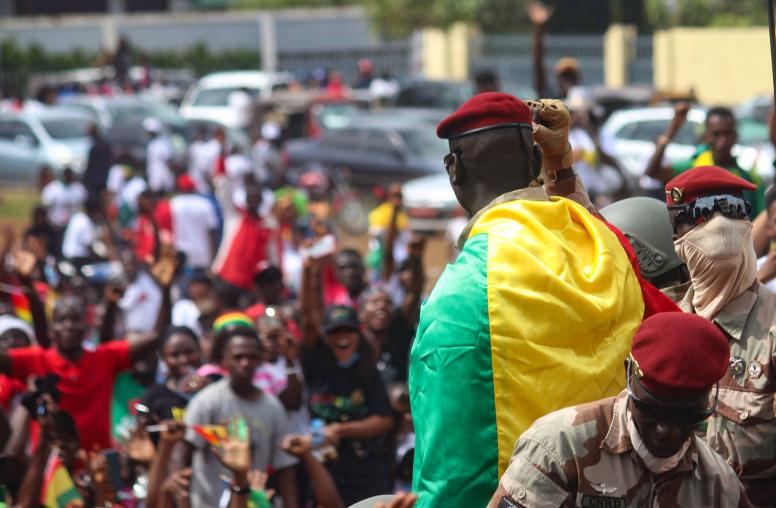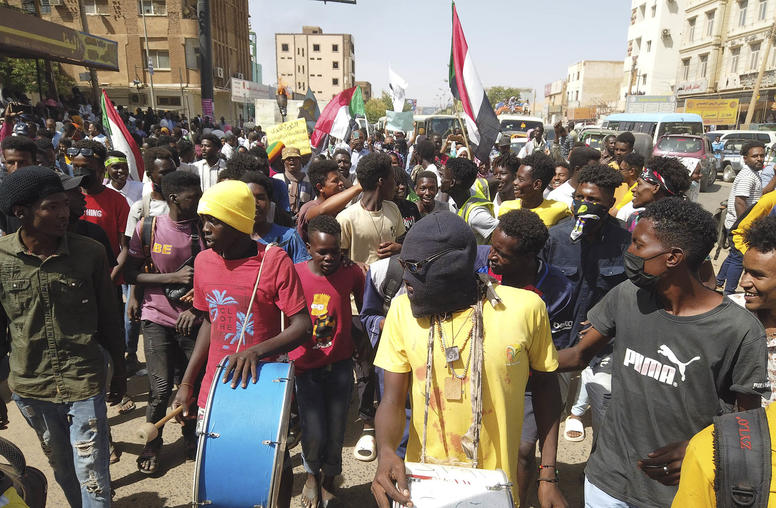Guinea’s Lesson for Strengthening Democracy: Use ‘Peer Power’
West Africa’s economic community shows that democracies’ best ally may be regional influence.
Editor’s Note: As the Biden administration convenes its Summit for Democracy, the U.S. Institute of Peace is convening a multi-part conversation about the shocking rise in military takeovers in 2021, featuring expert analysis on the dynamics driving coups in Sudan, Mali, Guinea and Myanmar and how regional institutions and global actors can help these countries get back on a democratic track.
As dozens of nations seek to strengthen democracy at this week’s White House summit, indicators for effective methods can be found in Guinea, one of five nations that this year suffered a coup by its military. An overarching lesson is for the United States and other more distant governments and institutions to recognize the greater efficacy of putting regional communities in the lead. For Guinea, this will mean supporting a stronger role by neighboring countries and the Economic Community of West African States (ECOWAS) — a 15-nation grouping that has shown real promise as a promoter of democracy.

The power of working through regional groups is at the center of recommendations this week by a group of West Africa experts in an online forum at USIP—recommendations that apply not simply to encouraging a democratic restoration in Guinea, but also to promoting democracy globally, as this week’s summit conference aims to do. This year’s series of military power grabs — in Chad, Mali, Guinea, Sudan and Myanmar — has seized headlines and policymakers’ attention as a sign of eroding democratic governance worldwide.
But, as Guinea shows, coups are only part of the problem. When army soldiers seized power in the capital, Conakry, on September 5, their takeover was simply an extension of a democratic erosion under the 11-year rule of the man they overthrew, President Alpha Condé. Condé, who earlier had advocated for democracy and human rights in Guinea, was first elected in 2010. But unrelieved corruption, notably in Guinea’s lucrative mining industry and in public administration, undermined the quality of democracy under his rule. In 2020, Condé used the power of his office to arrange, and declare victory in, a disputed referendum to remove Guinea’s constitutional two-term limit for presidents. That was a limit that more than 80 percent of Guineans supported, according to the independent pan-African research group Afrobarometer. Condé’s abrogation of the limit, and his declaration of victory in a subsequent election for a third term in office, led to public protest, violence and human rights violations.
Thirteen African heads of state since 2015 have altered constitutions or otherwise undermined two-term limits to extend their hold on power, according to Joseph Siegle, research director at the National Defense University’s Africa Center for Strategic Studies. The international community has tended to overlook or respond ineffectually to such civilian leaders’ weakening of democratic norms, a significant gap in building a coherent system of support for democracies, according to Siegle and other experts in the USIP online forum.
For the global effort now sought by the Biden administration to strengthen democracies worldwide, ECOWAS offers a promising example.
The Underuse of ‘Peer Power’
For the global effort now sought by the Biden administration to strengthen democracies worldwide, ECOWAS offers a promising example. It is one of eight African regional economic communities that the 55-nation African Union says form its “pillars” — and from which the continent-wide body most often takes its lead in responding to crises in their respective regions. In 2001, ECOWAS approved a Protocol on Democracy and Good Governance as its main mechanism for opposing the authoritarian rule, exclusion of minorities and human rights abuses that inevitably lead nations to instability and conflict.
Following the coup by Guinea’s army and a failure of the army-led government in Mali to hold to a timeline for a swift return to civilian rule, ECOWAS convened emergency summit conferences and imposed punitive sanctions against both juntas. U.S. and international policymakers would do well to recognize that such “peer-to-peer influence among African heads of state is very important,” while the influence of traditionally powerful but distant governments and institutions “is limited,” said Alexis Arieff, a specialist in African affairs with the Congressional Research Service.
Still, Arieff and other experts say, ECOWAS, like other international institutions, is “much more forward leaning and inclined to punitive action in the wake of military coups that overthrow elected presidents than they are in opposing unconstitutional third terms or other abuses of power … by sitting presidents.”
Filling that gap should be an early goal, said Chris Fomunyoh, a longtime democracy advocate who directs work on Central and West Africa at the National Democratic Institute. And indeed, ECOWAS has come close to a groundbreaking step — a resolution among its governments to establish a regional standard limiting presidents to two elected terms in office. “Thirteen of the 15 presidents were favorable,” Fomunyoh said. U.S. and allied policymakers can work with ECOWAS to strengthen its pro-democracy protocols with this and other steps, added Ibrahima Amadou Niang, a democracy advocate and poet who directs work in West Africa for the Open Society Institute. He noted that ECOWAS has begun an effort, hiring experts to propose draft changes, to update its now 20-year-old protocol on democracy, and urged pro-democracy institutions to help energize that effort.
Taking the Vital Actions
As the U.S. administration and others look to reverse erosions of democratic governance, this overall approach — boosting the roles of regional peer groups of nations—should be underpinned by several basic areas for action.
- Proactively build consistent incentives of partnership with governments and civil societies to strengthen democratic governance. Doing this well requires that governments and institutions repair a tendency to focus too exclusively on the mechanism of periodic elections. Guinea has provided one of many examples where the undermining of democracy was achieved in the long periods between elections. U.S. and international assistance programs should be offered steadily, as long-term partnerships. And those partnerships should include both aid and investment to sustain economic development and delivery of basic services, notably in the face of challenges to stability — from COVID to demographics to climate change.
- Consistently apply the muscular sanction of non-cooperation with military or autocratic rule. Consistency is vital, said Fomunyoh, to avoid undermining U.S. or international advocacy with demonstrations of hypocrisy that will be noted in a global informational village. And critical U.S. or international rhetoric against reversals of democracy often have not been accompanied by the necessary backup of concrete actions — notably, the obvious and available leverage of economic, financial and diplomatic sanctions.
- Support a widened civil society and its natural aspirations for democracy. These represent strong resources with which to work in Guinea. Among France’s African colonies, Guinea was the first, in 1958, to demand and declare its independence (a choice for which France imposed a punishing isolation). While the country has suffered three armed coups since then, popular insistence on elected, democratic rule remains strong. Yet over time, the frustration of those aspirations risks throttling citizens’ energies to improve their own governance. It’s vital to avoid repeated frustrations of activism through which civic engagement putrefies into apathy.
- Buttress inclusive processes of national dialogue. Guinea is a country where “we are seeing more will from the people to have internal dialogues to … find solutions to their own problems,” said Niang. Foreign governments and international institutions should promote broad, deep and formalized dialogue processes that embrace those who historically have been marginalized—ethnic minorities, women, youth and grassroots groups.
- Promote citizen engagement and oversight of governance as the shield against interference by outside autocracies, including Russia, China and some Gulf nations, that seek their own influence by cooperating with military or autocratic regimes. The United States should ally with democratic partners—especially those in the region—to promote local accountability, transparency and citizen oversight to reduce the risks of a junta or autocrat allying with external practitioners of authoritarianism.
Three months after the coup in Conakry, international pressures on the junta so far have helped produce “positive developments,” said Niang. “We still don’t have a very clear timetable” for cleaning corrupted voters’ lists, organizing elections and repairing the constitution, he said. But the junta is “making efforts to rebuild the relationship with the regional organization [ECOWAS] and also the international community.” The efforts include the establishment of a court to prosecute financial and economic crimes and a vetting of corrupted lists of civil servants and senior military officers. An interim legislative council is expected to be established by the end of this month and a timetable for the full transition to civilian rule by the end of January. ECOWAS has said it will review conditions in Guinea and may consider additional steps to press for a return to civilian rule at its next regular summit meeting, on December 12.




